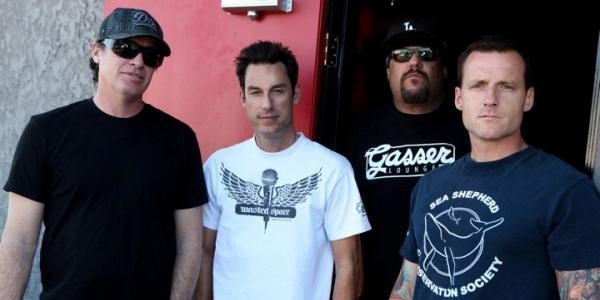“The shows have been sold out and the crowds have been going absolutely crazy,” he states. “Obviously we missed Jim, so we’re definitely stoked and the vibe onstage is awesome. It hasn’t been this fun for a long time.”
Due to the central role vocals play in shaping a rock band’s identity, the departure of a singer often leads bands to call it quits. However, Dragge claims that for himself, bassist Randy Bradbury and drummer Byron McMackin, Lindberg’s departure didn’t signal the end of Pennywise.
“We definitely knew we were going to try something, we didn’t know who it was going to be, we didn’t know how it was going to be. I know he [Lindberg] wasn’t stoked about that, but he knew we were probably going to do that.”
Hearsay at the time of the Lindberg-Teglas changeover suggested Lindberg amicably approved of the other three persevering without him, but Dragge reveals much irresolution surrounded the split.
“Twenty years of being in a relationship, shit gets pretty crazy and he needed a break and we weren’t really willing to give him a break. We moved forward and he did his thing. The minute he quit I didn’t speak with him so I never really got his side of the story, there was no closure,” Dragge says.
Dragge, Bradbury and McMackin were determined to prove that Pennywise’s defiant strength could counter any setback. However, Dragge admits that recording All or Nothing “didn’t feel like a Pennywise session” and alludes to how deeply the in-studio contrast affected them.
“We had a guy in the band that had only been in the band for a year and you’ve got a guy, Jim, who you grew up with in the same town, hung out with, went to school with and spent your early years in a garage writing songs and playing backyard parties [with] and that’s what Pennywise was built on.”
It’s easy to perceive how pairing Teglas’ individual habits with Pennywise’s well-established mode of practice would have posed obstacles for the modified incarnation of the band. Dragge explains that it became increasingly apparent someone else couldn’t easily be inserted into the band.
“Being on stage it was the same thing. Zoli’s up there doing his job, he’s very mechanical and by the book, and militant almost. Jim’s very loose, having a couple of beers and just having a good time. Not trying to knock Zoli, he did his thing and did his part the best he could, but at the end of the day it was no secret that everybody wanted Jim to be on that stage,” he says.
The enforced intimacy that comes with being a full-time touring and recording band can certainly put a strain on inter-band relationships. Dragge honestly relates that in order to re-establish the band’s optimum format some thorough personal reflection was required.
“I spent a lot of time trying to blame Jim for a lot of stuff when in reality it was everybody’s fault. I had just as big a role. I was a drunken nightmare running around terrorising people for 20 years and that takes its toll.”
Swallowing personal pride was crucial for Pennywise to rationally sort out their differences and Dragge explains the repair process also reminded them of the band’s original ethos.
“We were able to say, ‘Let’s figure out how we can continue and let’s make sure everybody’s having a good time,’ because in the end that’s what Pennywise is all about: making sure everyone’s having a good time and being positive, and we’ve attained that once again remarkably enough.”
Ever since their breakthrough in the early ‘90s Pennywise have imprinted a furious mark on punk music, subsequently injecting enriching importance into the lives of their many devoted followers. Dragge speaks proudly about the extent of subjective influence they continue to wield.
“It’s an honour that our music has moved people enough to make a difference in their lives and make them be like, ‘Hey you’re a real inspiration to me.’ There’s not a lot of jobs out there where you can inspire people. Actors inspire people, musicians inspire people, politicians, teachers, but, you know, there’s a lot people that just work in a deli making sandwiches. They might make a damn good pastrami sandwich but they’re not really inspiring people,” he asserts.
Dragge is candidly aware of Pennywise’s inspiring impact but he doesn’t speak with arrogance and stresses they have an easy-going relationship with their fans.
“We’ve always been very approachable, we’re just normal guys who play some instruments. We don’t consider ourselves celebrities or rockstars; we’re no better than anybody else and no worse than anybody else. We never wanted to be hugely popular, we just wanted to be some guys that wrote good music and connected with their fans and to do what we love and make a living doing it.”
BY AUGUSTUS WELBY







